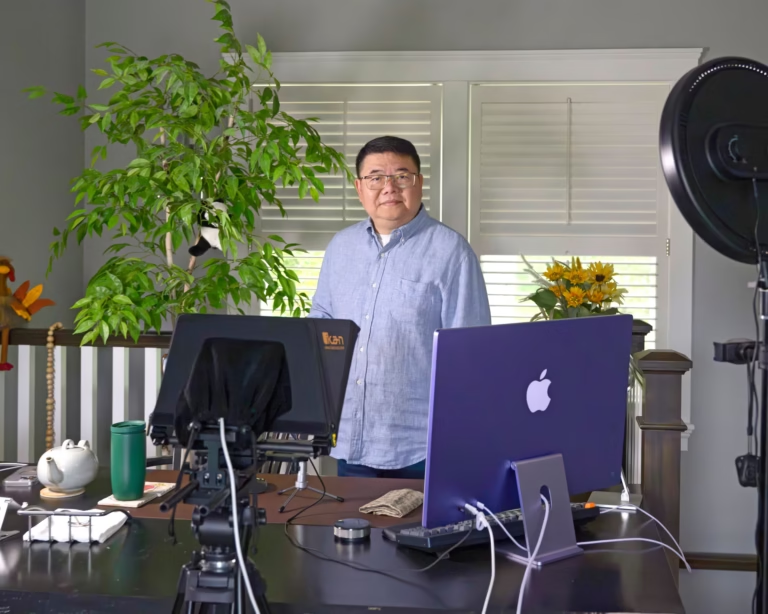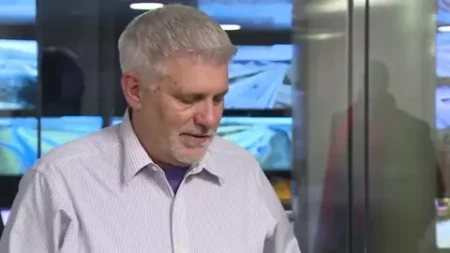Wang Jian, once a leading journalist in Hong Kong, has become a notable voice on YouTube, dissecting US politics and China-US relations. Broadcasting from his home near Boston, Wang reaches an audience of over 800,000 subscribers, offering insight often unavailable in mainland China.
On a rainy May evening, Wang prepared for his second broadcast of the day. Eating dinner in his garage apartment, he spoke in Mandarin about former President Donald Trump. “Trump combines populism, small-town savvy, and wealth,” he said. “It is reminiscent of Mao Zedong’s style.” By 11 p.m., Wang was live, his ring lights on, guiding viewers through political events with the cadence of a news anchor and the curiosity of a professor.
Wang is part of a wave of journalists who left Hong Kong and mainland China over the past decade. His broadcasts target Chinese expatriates and mainland viewers who bypass China’s Great Firewall. These audiences rely on Wang to fill gaps left by censorship, propaganda, and disinformation.
Viewers praise his professionalism and balanced reporting. He blends objective news delivery with personal reflections, often posing rhetorical questions and using informal interjections, making his shows engaging and relatable. Wang frequently compares US politics to China’s authoritarian past, offering historical context and sharp commentary. “Americans are democracy’s equivalent of second-generation wealth,” he says. “They were born into democracy and do not understand life without it.”
Wang’s analysis also critiques US media coverage. He notes that while many reporters provide competent reporting on China, domestic coverage often misses key nuances. “If I were the New York Times, I would use curse words on the front page every day,” he jokes. He believes Trump misjudged US strengths, relying on allies and currency power rather than domestic skills. Wang often contrasts Trump with Xi Jinping, noting similarities and differences between their leadership styles.
The YouTube broadcasts are structured in three segments: news updates, in-depth analysis, and viewer interactions. Wang addresses questions ranging from immigration policies to consumer advice, blending commentary with practical guidance. His audience responds actively in the comment sections, discussing both US and Chinese news. Local issues in China, often censored, surface in these interactions, giving viewers a glimpse of reality beyond government-approved narratives.
Wang’s journey began in Nanshan County, China, where he dreamed of journalism despite his parents’ concerns. He studied at Jinan University in Guangzhou before moving to Hong Kong in 1990, joining Ming Pao and later Sing Tao Daily. He built a reputation for honest reporting during a period of increasing restrictions under PRC rule. Concerns over press freedom and attacks on journalists eventually led him to retire in 2016 and relocate to the US in 2018 with his family.
In the US, Wang’s passion for reporting reignited. He began hosting discussions at family gatherings in 2019, moving online as interest grew. The pandemic accelerated his broadcasts, as viewers sought trustworthy information during lockdowns and restricted media flows in China. Wang now runs a team of researchers and supports his channel through memberships, Patreon, and merchandise.
Wang represents a new type of media influencer: a Knowledge and Opinion Leader (KOL) bridging audiences across borders. While many Chinese KOLs focus on lifestyle or entertainment content, Wang specializes in political news, offering both perspective and analysis unavailable through state channels. His work reflects a belief that access to reliable information empowers individuals to understand and shape their world.
Despite long hours and limited sleep, Wang continues to broadcast twice daily, providing analysis, answering questions, and mentoring his audience on media literacy. He frames his work as a mission to help people navigate complex political landscapes. “This world is made up of countless puzzles,” he says. “What is happening in the US is one of them. Broadcast better, be better.”







